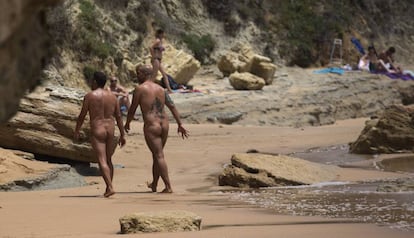Why some nudists are being marginalized on the Spanish coast
Despite Spain’s fame for naked sunbathing, naturists are being ordered to keep to themselves by local councils and the Supreme Court

Cortadura beach in Cadiz is known as “meerkat beach” due to the number of peeping toms who bob up and down from behind the dunes to catch a glimpse of “the action” below.
It is the only beach in the city of Cadiz where nudism is tolerated and although most people wear swimsuits or bikinis, there is every chance the peeping toms will be rewarded with the sight of a bare bottom.
The Supreme Court considers local authorities have the right to regulate against nudism since public scandal offenses are no longer a part of the penal code
“It is always the same two or three voyeurs. We recognize the way they pop up from behind the dunes and we have our eye on them,” says José Manuel, 51, a confirmed nudist who took years persuading his partner Isabel to go topless.
José Manuel likes to go nude because he feels more comfortable that way. “I can’t stand wearing swimwear,” he says while his partner is the opposite. “I wouldn’t be comfortable wearing nothing,” she admits.
Although Cortadura is not an official nudist beach, there is a certain tradition and the police turn a blind eye, whereas on the other beaches in the city you could be fined up to €750 for stripping off and breaking the anti-nudity law passed in 2009 by the then-PP city council. This law has since been backed by the Supreme Court, which considers local authorities have the right to regulate against nudism since public scandal offenses are no longer a part of the penal code.
Cádiz is the fourth instance of a high court endorsing a law against nudism. Last year the same thing happened in Barcelona and the town of Castell-Platja s’Aro, Girona, while just a month ago in Valladolid, nudism or swimwear in public places was outlawed.

Curiously, nudism is only illegal on specific beaches in Cadíz, Barcelona and Castell- Platja s’Aro, which in practice means that someone could legally emerge naked from their home until reaching the beach where they would have to get dressed, as Ismael Rodrigo, president of the Naturist Spain Federation (FEN), points out.
With a membership of around 3,000, FEN is taking the right to be nude to the European Court of Human Rights, which ruled in 2014 that nudism was protected by article 10 (freedom of expression) of the European Convention of Human Rights.
The most famous nudity case that has recently come before the European Court of Human Rights was, of course, that of Stephen Gough, “the naked rambler”, who was jailed repeatedly for breach of the peace in the UK. He did not, however, win his case against the United Kingdom since his persistent nudity was considered “against the standards of accepted public behavior in any modern democratic society.” In other words, Gough’s conduct was not beach-bound and, in fact, he even refused to dress for court.
“We’re not talking going nude along the street,” says Ismael Rodrigo, who is concerned that the Supreme Court’s endorsement of the anti-nudist laws will lead to more councils imposing similar rulings. “Our fight is for situations where clothes are unnecessary.”
Just three fines
However, the only time anyone in Cádiz has been fined for going nude is when Javier García swam in 2010 with two friends at Victoria beach, in the south of Cádiz. “We were protesting against the anti-nudism laws,” says García. “We called the press and went for a swim in the nude.“
García and his friends had hardly got past their knees when the local police turned up and fined them €600 each. But García took the matter to court and won his case as the judge concluded they were exercising their right to freedom of expression.
Since then, neither the subsequent PP authorities nor the current Cádiz branch of Podemos have bothered to fine anyone else.
The European Court of Human Rights ruled in 2014 that nudism was protected by article 10 of the European Convention of Human Rights
The main reason for this is, of course, that nudists don’t bother going to the urban beaches but prefer to relax at Caños de Meca (Barbate), Bolonia (Tarifa), El Palmar, (Vejer) or simply stick to the Cortadura beach in the capital.
“I would never normally go nude at the Victoria beach,” says García. “The city beaches are very crowded family beaches. What I’m looking for is a bit of peace and no one staring. Nudists regulate themselves. There’s no need to pass a law against us.”
But the president of Fen is not happy with specific beaches being defined as nudist. “They shouldn’t be labeled like that.,” he says. “There are beaches that are traditionally nudist but if you put up signs saying Nudist Beach, it implies that nudity is prohibited elsewhere.”
Segimon Rovira, president of the Catalonian Naturists Club, disagrees. He would like to see nudist beaches signposted as such so that non-nudists respect them for what they are. “Sometimes they fill up with people in their swimwear and there’s no room for us,” he says.
English version by Heather Galloway.
Time to throw out the veto?
The councils in Barcelona, Valladolid and Cadíz all changed mayor last year and the idea had been floated to revoke the anti-nudist ruling, though none have yet got around to it, despite nudist associations pushing for a commitment.
“This summer the plan is to have an information campaign rather than actually fining anyone, but if someone decides to report a nudist, the police will have to act,” says Manuel González Bauza, counsellor for Cádiz beaches.
So far, this has never been the case. “It doesn’t bother me if there are nudists,” says Luz Márquez, who is sunbathing on Caleta beach in the center of Cádiz. “But this is a family beach with a lot of children and there are better places to go nude.”
According to Segimon Rovira, president of the Catalonian Naturists Club, “They use children as an excuse when in fact the children are the least bothered by it.”
Tu suscripción se está usando en otro dispositivo
¿Quieres añadir otro usuario a tu suscripción?
Si continúas leyendo en este dispositivo, no se podrá leer en el otro.
FlechaTu suscripción se está usando en otro dispositivo y solo puedes acceder a EL PAÍS desde un dispositivo a la vez.
Si quieres compartir tu cuenta, cambia tu suscripción a la modalidad Premium, así podrás añadir otro usuario. Cada uno accederá con su propia cuenta de email, lo que os permitirá personalizar vuestra experiencia en EL PAÍS.
¿Tienes una suscripción de empresa? Accede aquí para contratar más cuentas.
En el caso de no saber quién está usando tu cuenta, te recomendamos cambiar tu contraseña aquí.
Si decides continuar compartiendo tu cuenta, este mensaje se mostrará en tu dispositivo y en el de la otra persona que está usando tu cuenta de forma indefinida, afectando a tu experiencia de lectura. Puedes consultar aquí los términos y condiciones de la suscripción digital.









































